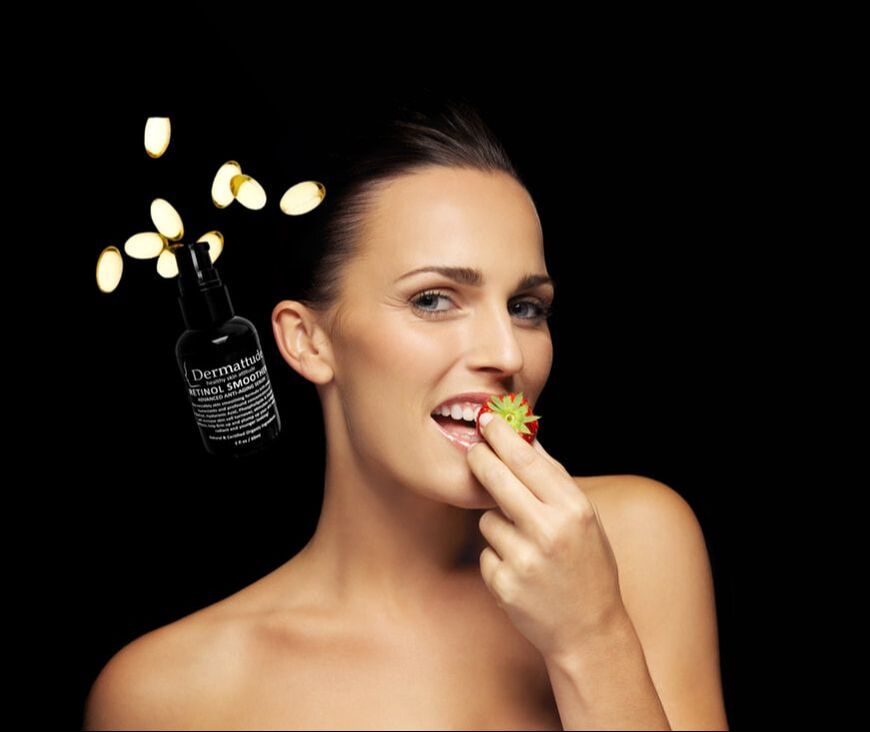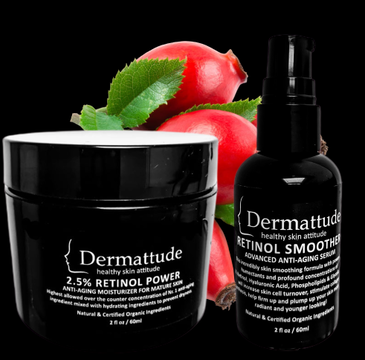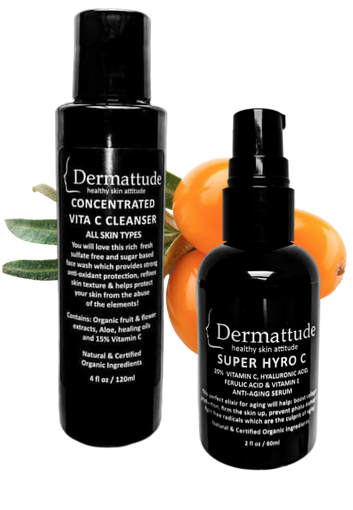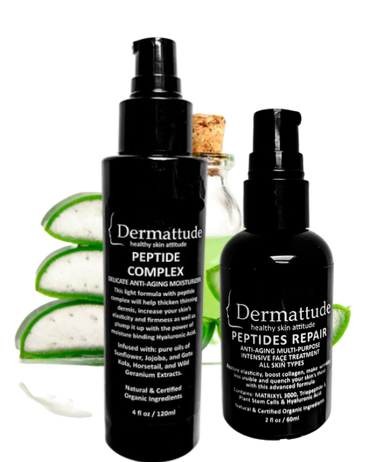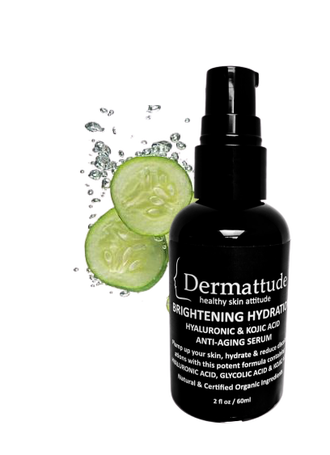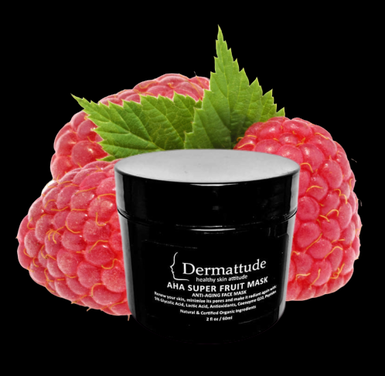|
Anti-aging ingredients are like food supplements for the body. As we age, our bodies require more and more help with fighting aging and to support age defense mechanisms, such as cell renewal processes, metabolism, inflammation, or DNA repair. Healthy food and supplementation can help the aging body. Skin, just like the rest of our body, undergoes similar changes as well. To better understand the concept, think of your skin as a factory constantly making new cells, fibers, as well as renewing what's old. This factory works very efficiently when we are young, however like everything else, including our body or even our car, it undergoes wear and tear. No matter how well we take care of it, it will eventually break down. With that being said, just like proper maintenance and a tune up can help us keep a car in a great shape for longer, self-care will help keep our body and our skin looking and functioning better for longer as well. Many people know of superfoods and that eating healthy is crucial for optimum health, but the general population is not aware that the same goes for skincare, and that it is not only what you put in your body that matters, but also on your body. If you have read "Nourish Your Skin" , you probably remember reading about the health aspect of putting certain ingredients on our skin, as well as for their anti-oxidant protection of the skin. In fact, one of the functions of skincare is to protect our skin from environmental pollution. Ironically many of the ingredients in the commonly used skincare contains toxic ingredients that in fact add fuel to the fire. Part 4 of this guide - Ingredients to Avoid - talks about the toxicity of some of those ingredients that short term might not do any harm, but over the course of many years will not. Why "protecting" your skin with toxins if there are natural superfoods that will do that and more? We talked about the superfoods in the "Nourish Your Skin" part, and we will now focus on the science behind some of the anti-aging superstars. Let's take a look at the dermis and epidermis of our skin, and what happens there to better understand the importance of anti-aging ingredients. Dermis is the second part of our skin. As we age, it becomes thinner as it loses collagen that gives the skin its flexibility. You can't see the dermis, as it hides under the top layer of the skin, but it is the part of your skin that reflects what your skin looks like on the outside. 90% of your skin is the dermis. When we are young, dermis is filled with collagen. Collagen is what keeps our skin young, and comprises 70-75% of dermis. Collagen gives our skin elasticity and that nice softness due to the support it provides to elastin fibers. It also makes our skin plump as it provides support for hyaluronic acid (see the image). Unfortunately, ever since we are in our 20ies, we start to lose 1% of collagen a year. With its breakdown, and its inability to synthesize more of it with the same speed as when we were young, our skin starts to for example show wrinkles, as well as loses its firmness and that nice plumpness and softness. One of the other visible signs of aging skin is that it also becomes drier. That dryness is a result of changes in the bonding between the dermis and upper layer of the skin, called epidermis. The connections become flatter which is why fewer nutrients move to the outer layer of our skin. As a result, there are fewer moisture holding molecules between the two layers of the skin, which causes called so called Transepidermal Water Loss. Moving on, lots of other changes happen also in our top layer of the skin, called epidermis. Epidermis consists mainly of cells called keratinocytes, made from the tough protein keratin that is also the material in hair and nails. Keratinocytes form several layers that constantly grow outwards as the exterior cells die and flake off. This covering of dead skin is known as the stratum corneum, or horny layer, and its thickness varies considerably, being more than ten times thicker on the soles of the feet than around the eyes. In addition to the transepidermal water loss which makes our skin dehydrated and looking tired, stratum Corneum, or that above mentioned top layer of epidermis, starts to accumulate more and more deadly skin cells that the aging factory can't keep up with the renewal of. These old keratinosites, do not renew themselves as often as when we are young, and make skin look pasty, as oppose to glowing. The reason for it is that when we are in our 20-ies, those skin cells shed and renew themselves every 21 days, but when we are in our 50ies for examples, every 50+ days. Shedding old skin cells that rise to the surface of the skin is one of the main functions of epidermis, and this function slows down. Another change you can notice in aging skin is in pigmentation due to the decrease in the number of melanocyters by 10-20% each decade. Melanocyters are the cells that produce melatonin that gives pigmentation or color to our skin. Some areas don't have any of those cells, and others have more because they are trying to produce those cells as hard as they can. The result is blotchy skin with uneven blotchy pigmentation, and some parts of it much darker than others. Finally, epidermis thins out and not only shows discolorations more, but makes your skin prone more to scarring and bruising. In addition to the above changes, that are just examples of what happens in our skin, muscles and fat cells become smaller. All these changes contribute to the appearance of aging skin. We hope that understanding the above processes will be helpful in understanding how anti-aging ingredients can help slow down the damages that occur within our skin and make what happens in the skin factory work more efficiently, so your skin looks and functions better longer. Truth is, that anti-aging actives, if formulated and used right, can be your tools to a younger skin. They are like supplements for the body, and we have comprised a list of those for you based on the research in medical journals, so you can help the mechanisms in your skin factory function better with the right tools. RETINOL (Vitamin A) It is probably the most studied anti-aging ingredient and your probably most powerful tool when it comes to aiding the above mentioned cell turnover that slows down as we age. It works by removing dead skin cells that cause dullness of the skin. In addition to speeding up the cell turnover, Retinol also boosts collagen production and thus elastin production, which treats fine lines and slows down wrinkles formation. It thickens the top layer of the skin that thins out as we age and improves its texture. By pumping up circulation and increasing blood vessel formation, retinol also makes your skin less dull (1,2) When you use retinol consistently, your skin will look healthier. You do not want to skip this ingredient in your skincare regimen. Know that Retinol is an OTC form of a stronger Retinoid Acid available only by prescription for treating acne, but often used off-label for ant-aging benefits. The OTC Retinol, if used in high concentration and if formulated well, can be just as effective as the stronger prescription version, but will not cause the irritation, extreme dryness, sensitivity to the sun, and other negative side effects that is often associated with the use of the off label Retinoid Acid. Retinol in Dermattude: Few of our products contain retinol, but two of them contain their strongest allowed concentration: 2.5% Retinol Power moisturizer & Retinol Smoother serum also with 2.5% Retinol in it. We recommend that use these at nighttime, but if used during the day, make sure you use SPF as even though not all science supports the fact that Retinol makes your skin more sensitive to the sun, we want you to be safe than sorry. |
|
VITAMIN C To best explain the role of vitamin c in your body, imagine your skin as a trampoline and you jumping on it. When we are young, our skin is elastic, and just like a trampoline with new springs, it will spring back to the original position. With age, these springs become weaker and weaker, and so does collagen in our skin. One of the reasons this happens is because we lose a tremendous amount of vitamin c as we age, and our body needs it to synthesize collagen. As a result, our skin starts to sag and show deeper wrinkles. Good news is that using Vitamin C in skincare regimen can help slow down this process, so your skin can synthesize collagen longer. But this is not it as far as the benefits of topical vitamin for the skin go. Vitamin C also prevents the damage causes by UVA and UVB exposure caused by sun exposure that even the strongest SPF can only block up to 55% of. What vitamin C does is that it neutralizes the free radicals that did not get blocked by the sunscreen and makes them harmless. Finally, Vitamin C is also helpful in reducing age spots and the damage already caused by the sun. Finally, vitamin c also helps with TEWL and makes your skin less rough. Be sure to include vitamin c in your skincare regimen. It is your ultimate tool to fight wrinkles, photodamage, water and elasticity loss, and even skin roughness. It also supports wound healing and helps prevent skin cancer some say. It is crucial to include a well formulated vitamin c product in your skincare regimen. Studies have shown that vitamin c applied topically will be more beneficial to the skin than the one ingested as the ingested one does not transport the vitamin c to our skin efficiently as we age. VITAMIN C in DERMATTUDE - Our Super Hyro C vitamin c serum has a whopping 20% of the most absorbable form of currently bioavailable form of Vitamin C. Additionally, we have supercharged it with Vitamin E and Ferulic Acid to almost triple its photodamage fighting protection, as studies show that adding those two ingredients will make it much more potent. We have also loaded our VITA C concentrated cleanser with 15% of this ingredient, and have included it in almost every other product in our line. |
|
PEPTIDES Peptides are now considered one of the most important ingredients in anti-aging skin care due to their well-known ability to revitalize skin texture and tone. They can stimulate the synthesis of collagen and other essential components of youthful skin. These micro-fragments of collagen or short strings of amino acids are the building blocks of collagen and can also help promote deep tissue repair and diminish the appearance of wrinkles and fine lines. There are many types of Peptides out there, in fact hundreds of them, but the most the most commonly used peptides in skincare are often listed as argireline, matrixyl (palmitoyl pentapeptide), and pentapeptides, palmitoyl oligopeptide and copper peptides. For most of them, you need to take the manufacturer's word for it as there have been very few independent studies done on their effectiveness, but Matrixyl 3000 is one we will focus been in the limelight of the beauty industry due to the studies by Sederma, beauty company, but also one in Redding University in UK. The studies have proven that Matrixyl 3000 can have a great effect in the repair of collagen. Even though it is trademarked by a French beauty company, it is now most loveable skincare ingredient. Matrixyl signals cells to generate more collagen to preserve and sustain a youthful skin. We could not help, but pack our products with it as well. Peptides in Dermattude- Peptide Complex (building blocks of peptides) moisturizer; Peptides Repair treatment, Cutting Edge eye cream |
|
HYALURONIC ACID
Hyaluronic Acid or HA naturally occurs in our skin. Babies have the most of it, and that is why their skin is so nice and plump. With age and the breakdown of collagen, comes also a major decrease in HA as well, which makes our skin less plump and less hydrated. In addition, the above mentioned TEWL causes skin to become even more dehydrated, and thus looking tired and wrinkled. HA is your solution to dehydrated skin as it has the ability to hold 1000 times its own water weight, and hydrates the skin by drawing in moisture from the atmosphere and deeper layers of the epidermis. Anytime someone talks about well moisturized skin, they refer to a nice content of moisture in the skin, so make sure you include a well formulated product with HA in your skincare regimen. If you have oily skin, make sure you know that oily skin can become even more oily if you do not keep it hydrated as it will start producing even more oil to make up for water loss. Studies have shown that using a product with HA will increase skin's elasticity and decrease wrinkles. And even if the molecule size of HA is too big to penetrate the skin, which is what is being speculated, a product with HA will leave your skin well hydrated, which will result in it looking more hydrated and healthier, and that alone is something that will make a huge difference n the way your skin looks and feels. HYALURONIC ACID in Dermattude is present in almost every product, but if your skin is very dehydrated, BRIGHTENING HYDRATION is your go-to serum. We have added kojic acid to it to help lighten the sun spots. |
|
GLYCOLIC ACID
Made from sugar cane, glycolic acid is one of five types of alpha hydroxy acids used in skincare, and your tool to a less pasty skin and more glow! Glycolic acid is a truly powerful chemical exfoliant (as opposed to physical ). Studies have shown that glycolic acid can reduce wrinkles and skin roughness. It also smooths skin by increasing collagen production and the content of above mentioned hyaluronic acid in skin. On top of that, it has been proven to be good for wound healing and photodamage. Glycolic acid will also help keep your pores unclogged as it works by releasing and dissolving dead skin cells clearing up blackheads and pores. Glycolic acid, as well as other alpha hydroxy acids, can be irritating to the skin. You can get a AHA peel at a medical spa, but if you use a product such as AHA Super Fruit Mask on regular basis, you will get the same results, and will not need to go for a tune up, but practice proper maintenance. AHA in Dermattude - AHA Super Fruit Mask as well as other products in lower concentration, such as Cutting Edge eye cream or the Reverse cream. |



